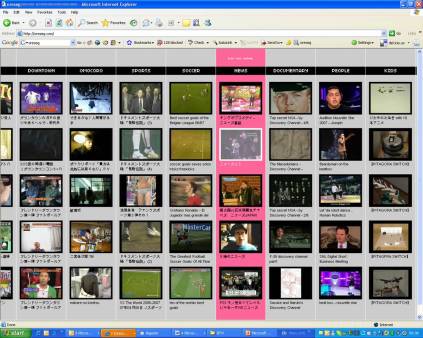Following the ruling, a few analysts (Arash @ Screen Digest, Nick Thomas @ Forrester/Jupiter) have come out and criticized the competition commission for a lack of foresight – Pirates must be delighted (Nick Thomas, Forrester).
And while the collaboration may be denied, the constituent players are still able to throttle competition: “Between ITV.com, Channel 4.com and Kangaroo’s core site, there will be little space left in the nascent online TV advertising market for the likes of Five, BSkyB (NYSE: BSY) and MTV. We believe the provisional findings suggest a lack of familiarity with online content markets.”
Arash at Screen Digest lamented the demise of the service that Didn’t know what it was…
Was it a subscription archive service? Was it an ad-supported archive service? Was it a catch-up service? Was it both but in different windows? Was it free or paid? Would it feature US hit shows or not?
At some point during the 20 months of its short life, Project Kangaroo was one or all of these things. In many respects, it was the brainchild of a confused pre-“iPlayer 2.0” era…
…Kangaroo was a waste of time and effort on the part of both ITV and Channel 4. As the dust settles, the focus will rightly shift towards ITV Player and 4oD which, if the BBC iPlayer and Demand Five are anything to be measured by, will have to make up for lost time if they don’t want to get lost in the noise. “
It’s certainly set the major broadcasters over here back a few steps, but opened a window of opportunity for others and all agree the market will continue to become more competitive.
We thought there was also an interesting – if slightly xenophobic – assertion in the ruling that UK viewers particularly valued programmes produced and originally shown in the UK!
Research is always an interesting beast – ask the man on the street what his favourite programme is and you can be confident it’ll be most recent show he’s seen and enjoyed; with the most popular content still found on the (dominant) terrestrial channels, of course UK viewers will seem to value UK produced shows.
The real reason this hooker our interest is because the ruling came out the day after The Culture Show ran a brilliant piece by Greg Dyke on the success of HBO. The raft of high-quality, challenging shows coming out of HBO (the Wire, Sopranos, Six Feet Under, Desperate House Wives) is increasingly recognized and lauded over here, at stark comparison to the home-grown dirge of reality eye-wash and mediocre ‘safe’ material – It’s all chewing gum for the eyes! (unable to access iPlayer? check accompanying Guardian piece here).
Ultimately, the consumer demand for high-quality, coupled with the increasing awareness of online video, means that regardless of Kangeroo cancellations market growth is a certainty here.





